The AMD 2nd Gen Ryzen Deep Dive: The 2700X, 2700, 2600X, and 2600 Tested
by Ian Cutress on April 19, 2018 9:00 AM ESTCPU Encoding Tests
One of the interesting elements on modern processors is encoding performance. This includes encryption/decryption, as well as video transcoding from one video format to another. In the encrypt/decrypt scenario, this remains pertinent to on-the-fly encryption of sensitive data - a process by which more modern devices are leaning to for software security. Video transcoding as a tool to adjust the quality, file size and resolution of a video file has boomed in recent years, such as providing the optimum video for devices before consumption, or for game streamers who are wanting to upload the output from their video camera in real-time. As we move into live 3D video, this task will only get more strenuous, and it turns out that the performance of certain algorithms is a function of the input/output of the content.
All of our benchmark results can also be found in our benchmark engine, Bench.
7-Zip 9.2: link
One of the freeware compression tools that offers good scaling performance between processors is 7-Zip. It runs under an open-source licence, is fast, and easy to use tool for power users. We run the benchmark mode via the command line for four loops and take the output score.
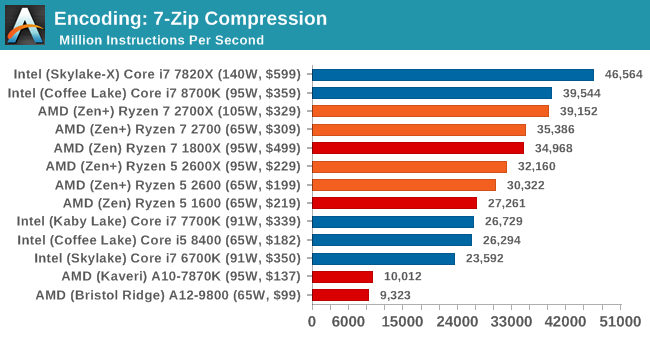
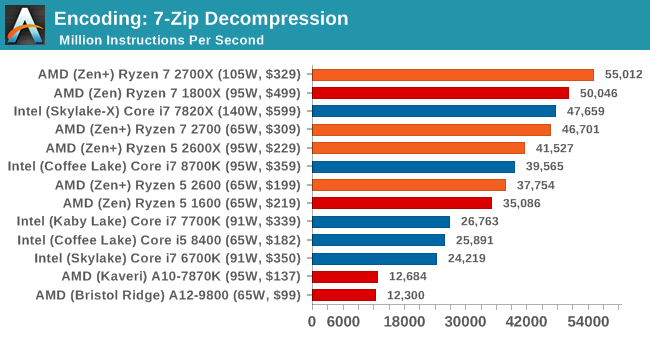
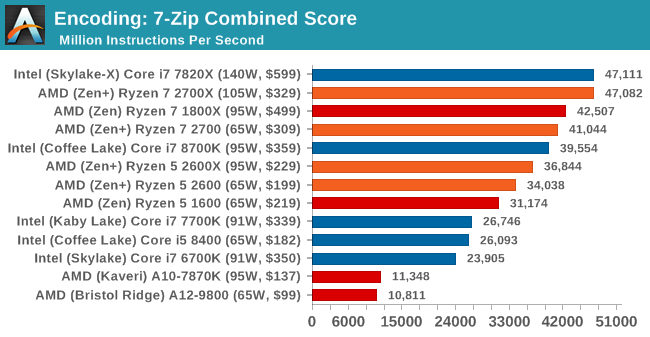
WinRAR 5.40: link
For the 2017 test suite, we move to the latest version of WinRAR in our compression test. WinRAR in some quarters is more user friendly that 7-Zip, hence its inclusion. Rather than use a benchmark mode as we did with 7-Zip, here we take a set of files representative of a generic stack (33 video files in 1.37 GB, 2834 smaller website files in 370 folders in 150 MB) of compressible and incompressible formats. The results shown are the time taken to encode the file. Due to DRAM caching, we run the test 10 times and take the average of the last five runs when the benchmark is in a steady state.
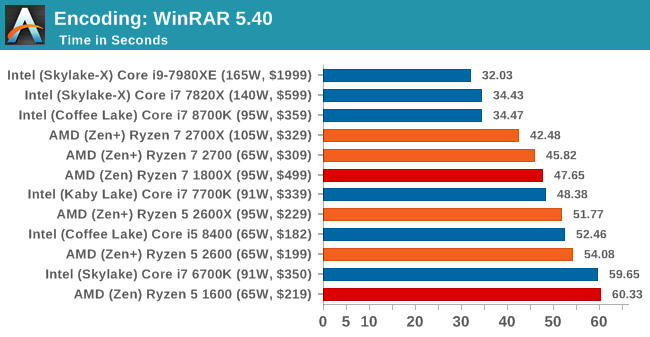
WinRAR requires a good memory base, so we see the quad-channel processors heading up the pack. The high IPC of the Core i7-8700K also does well.
AES Encoding
Algorithms using AES coding have spread far and wide as a ubiquitous tool for encryption. Again, this is another CPU limited test, and modern CPUs have special AES pathways to accelerate their performance. We often see scaling in both frequency and cores with this benchmark. We use the latest version of TrueCrypt and run its benchmark mode over 1GB of in-DRAM data. Results shown are the GB/s average of encryption and decryption.
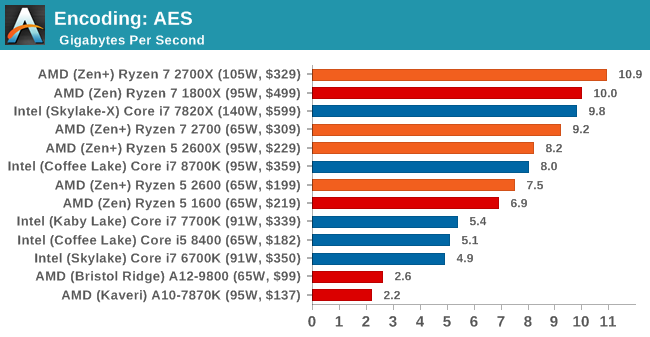
HandBrake v1.0.2 H264 and HEVC: link
As mentioned above, video transcoding (both encode and decode) is a hot topic in performance metrics as more and more content is being created. First consideration is the standard in which the video is encoded, which can be lossless or lossy, trade performance for file-size, trade quality for file-size, or all of the above can increase encoding rates to help accelerate decoding rates. Alongside Google's favorite codec, VP9, there are two others that are taking hold: H264, the older codec, is practically everywhere and is designed to be optimized for 1080p video, and HEVC (or H265) that is aimed to provide the same quality as H264 but at a lower file-size (or better quality for the same size). HEVC is important as 4K is streamed over the air, meaning less bits need to be transferred for the same quality content.
Handbrake is a favored tool for transcoding, and so our test regime takes care of three areas.
Low Quality/Resolution H264: Here we transcode a 640x266 H264 rip of a 2 hour film, and change the encoding from Main profile to High profile, using the very-fast preset.
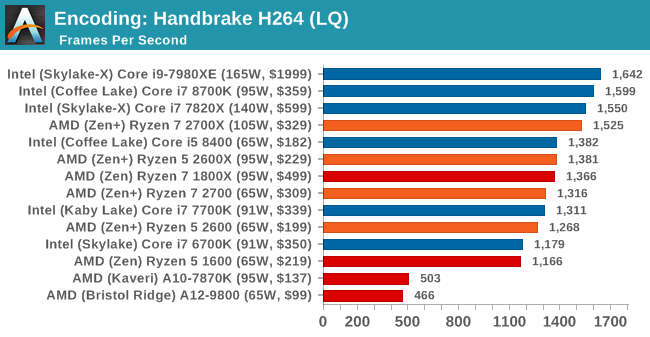
High Quality/Resolution H264: A similar test, but this time we take a ten-minute double 4K (3840x4320) file running at 60 Hz and transcode from Main to High, using the very-fast preset.
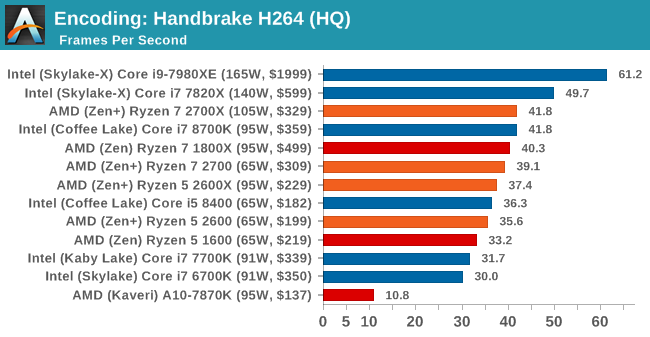
HEVC Test: Using the same video in HQ, we change the resolution and codec of the original video from 4K60 in H264 into 4K60 HEVC.
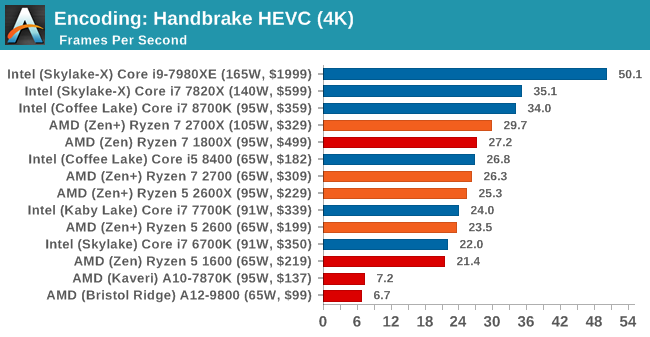
For HandBrake video encoding of large frames, there is a bump with the new Ryzen-2000 series processors over the previous generation, however there is still a gap up to the Core i7-8700K. The Core i5-8400 puts in a good showing here, above all but the best Ryzen parts.










545 Comments
View All Comments
eek2121 - Thursday, April 19, 2018 - link
Their benchmarks are garbage? You are welcome to buy a 2700X and test for yourself. The benchmarks they used are built in for the most part to each game. It coincides pretty much with what I know of Ryzen, Coffee Lake, and Ryzen 2xxx.AndersFlint - Thursday, April 19, 2018 - link
While out of respect for the reviewer's hard work, I wouldn't describe the results as "garbage", they certainly don't match up with results from other publications.ACE76 - Thursday, April 19, 2018 - link
Yes, Anandtech's are honest and objective...I believe Tech Radar was comparing Coffee Lake OC'd to 5.2ghz vs Ryzen 2700x at 4.1ghz...the stock turbo alone hits 4.3ghz...they are slanting to benefit Intel...a 5.2ghz stable overclock on Coffee Lake alone is very hard to achieve and maybe 10-15% of CPUs can do it.Luckz - Monday, April 23, 2018 - link
I haven't really heard of anyone unable to reach 5 GHz.SkyBill40 - Thursday, April 19, 2018 - link
Well, golly gee... did the other reviewers use the *exact* setup as used here? No? Hmm... I guess that then makes your grouchy mcgrouchface missive not worth consideration then, no? If anyone is to not be taken seriously here, it's you.Typical ad hominem and burden of proof fallacies. Well done, Chris113q.
Flying Aardvark - Thursday, April 19, 2018 - link
WRONG. AT has it right, these are properly patched systems. Heavy IO perf loss with Intel Meltdown patches has been well known for months. See top comment here. https://np.reddit.com/r/pcmasterrace/comments/7obo...Prove your claim that the data is incorrect or misleading in any way whatsoever, child.
RafaelHerschel - Thursday, April 19, 2018 - link
One of the problems is that other reviewers see a less pronounced difference between the new AMD Ryzen CPU's and the older ones. Most reviewers claim that they have tested with all available patches in place.Your conclusion that AT has it right is based on what? Your belief that AT can't make mistakes? Maybe there is a logical explanation, but for now, it seems that AT might have done something wrong.
Flying Aardvark - Friday, April 20, 2018 - link
I have evidence to backup my claim, users with no motivation to mislead agree with AT, and did months ago. You have no evidence, simply butthurt. Good luck.boozed - Thursday, April 19, 2018 - link
Let's ask a total jerk from the internet what he thinks.aliquis - Thursday, April 19, 2018 - link
They definitely used slower memory. Don't know if that's the thing. Don't know what fps others get in the same games and settings. Otherwise maybe it's ASUS doing special tricks like with MCE before or have better memory timits or can use some trick to get similar of precision boost overdrive already. Or a software mistake.Sweclockers is the best for game performance. They do 720p medium so the gpu limits will be smallest there.